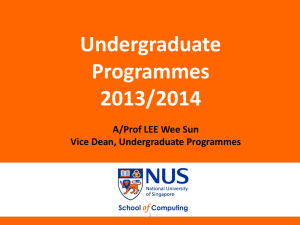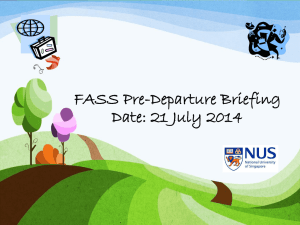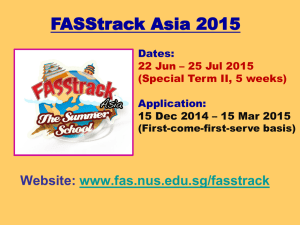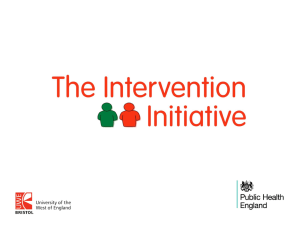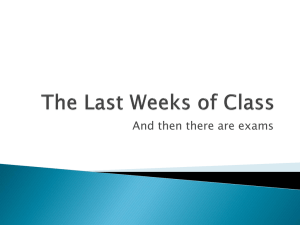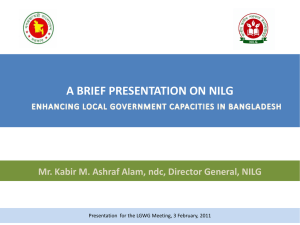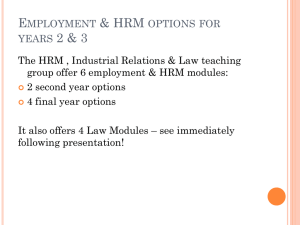Course Briefing 2012
advertisement
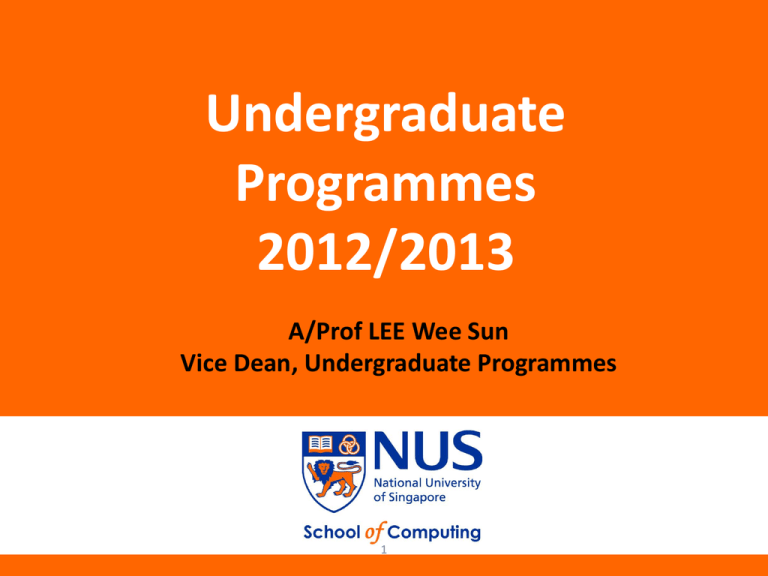
Undergraduate Programmes 2012/2013 A/Prof LEE Wee Sun Vice Dean, Undergraduate Programmes 1 Outline • • • • Degree Requirements Pre-allocation, CORS, Streaming Academic Challenge and Academic Advice Useful Information Degree Programmes Undergraduate Programmes: Bachelor of Computing (Honours) CB in Computational Biology Bachelor of Computing (Honours) CM in Communications & Media Bachelor of Computing (Honours) CS in Computer Science Bachelor of Computing (Honours) EC in E-Commerce Bachelor of Computing (Honours) in Information Systems IS Bachelor of Engineering (Honours) CEG in Computer Engineering Graduate Programmes: Master of Computing (by Coursework) Doctor of Philosophy 3 About this Course Briefing - I This course briefing is meant for students pursuing a Bachelor of Computing degree. Course briefing for Bachelor of Engineering in Computer Engineering will be delivered by the CEG Joint Academic Committee from both Faculty of Engineering and School of Computing. 4 About this Course Briefing - II This course briefing touches on general information relevant to studying in School of Computing It will not cover detailed information about individual programmes. Please attend the Programme Briefing this afternoon to find out more information 5 Module of a: module “Weight”Workload of a module 4MC ~ 10 hrs/wk The “MC” 5MC ~ 12.5 hrs/wk Must pass this module before taking CS3235 6 Must not have taken MA1100 before 7 Modes of Module Taking 1. Taking with Grade – Obtain a letter grade at the end of the course – A+, A, A-, B+, B, B-, C+, C, D+, D, F – Included in the calculation of your performance 8 Modes of Module Taking 1. Taking with Grade 2. Taking CS/CU modules – Pass/fail (completed satisfactorily/completed unsatisfactorily) 3. Taking the S/U Option – Encourage students to try modules outside their fields of study 9 S/U Option • Encourage students to try modules outside their fields of study – Obtain either a Satisfactory (S) or an Unsatisfactory (U) record – Not included in the calculation of your performance – Maximum of 12 MC to be counted towards your 160 MC requirement (under normal circumstances) – Irrevocable!! – Cannot exercise this option on modules: • a. required for Major/Minor requirement. • b. dropped with a “F” grade during the semester • c. in which a student has been found to plagiarize 10 Grade, Grade Points and S/U Option Note: A candidate who has obtained a D or higher grade cannot repeat the module. 11 Cumulative Average Point (CAP) CAP = sum (module grade point × modular credits) sum (modular credits) rounded up to 2 decimal places • Note: To graduate, a student MUST obtain a CAP of at least 2.00 12 CAP and SAP calculations (Example) CAP = 76/25 = 3.04 SAP (Semester Average Point) = 76/25 = 3.04 13 Degree Structure University Level Requirements (ULR) Common for all programmes in NUS Programme Requirement Programme Essentials Essentials specific to the programme Programme Electives If you fail an elective, you may retake or read another elective Unrestricted Electives (UE) 14 University Level Requirements (ULR) For all students admitted from 2010 Modular Credits (MC) University Level Requirements General Education Modules (GEM) 8 MC Singapore Studies 4 MC Breadth: Electives outside SOC 8 MC Total 20 MC 15 University Level Requirements (ULR) Two subject groups within which GEMs are placed, namely, (i) Group A: Science and Technology; and (ii) Group B: Humanities and Social Sciences. Compulsory to read at least one GEM from Subject Group B. Read one Singapore Studies module with SS prefix. ` For Breadth: Electives must be from outside of the student's Faculty. Note: No Double Counting of any module towards fulfilment of different requirements. 16 Programme/Major Requirements Programme Essentials – Core Modules/Computer Science Foundations/ … – Must pass all of them with letter grades – Include at least two programming modules – CS1010/CS1101S Programming Methodology – CS1020 Data Structures and Algorithms I Programme Electives – Each programme has its own list of elective modules – Allow you to choose modules from a basket – Must pass them with letter grades 17 • ULR • Programme Requirements • Unrestricted Electives – Modules from SoC/other Faculty to make up total modular credit requirement 18 Degree Requirements - I Pass at least 160 MC (approx. 40 modules) comprising: University Level Requirements – pass 20 MC Programme Requirements Fulfil Programme Essentials, Programme Electives Unrestricted Electives CAP must be at least 2.00. No more than 60 MCs at level-1000. 19 Degree Requirements - II Must Complete MCs at NUS, where is the greater of : 50% of required MCs for degree requirement 80 MCs These MCs must be earned from graded modules with assigned grade point. Only up to 12 MCs may be accrued from modules on S/U basis. A min of 60% of Programme/Major credits must be graded and factored into CAP. A min of 16 MCs of Minor must be graded and factored into CAP. 20 Degree Requirements - III No more than 60 MCs at level-1000. Poly Graduates: Advanced Placement Credits: 8 MC from ULR 12 MC from Unrestrictive Electives Up to 20 MC from programme requirement 21 Degree Requirements - III No more than 60 MCs at level-1000. Poly Graduates: Advanced Placement Credits: 8 MC from ULR 12 MC from Unrestrictive Electives Up to 20 MC from programme requirement 22 Degree Requirements - III No more than 60 MCs at level-1000. Poly Graduates: Advanced Placement Credits: 8 MC from ULR 12 MC from Unrestrictive Electives Up to 20 MC from programme requirement 23 Other Requirements Maximum Candidature for 4-year Programme: 5 Years Maximum Candidature for Double-degree Programme: 6 Years Number of MCs to read every semester: at least 15 MCs Completed the programme in 8 semesters, but want to spend the 9th semester to pull up your CAP? Possible Must take at least 15 MCs Must take only level 3 or above modules 24 Mind Twister CAP Honours First-class Adam is into his final semester. His CAP is 3.35, Second Upper and his total MC accumulated is 142. He intends Second Lower to take 20MC of modules in this semester. What should be his average grade forThird the final semester in order to get a CAPPass of 3.50? (Assuming no S/U options) Fail (142x3.35 + 20 x G) / 162 ≥ 3.50 ≥ (162x3.50 – 142x3.35)/20 = 4.57 Example: 4 of grade A- (4.5) and 1 of grade A (5.0) 2 B+ (4.0), and 3 A 1 B (3.5), 1 B+, and … 4.5 – 5, A- in HYP 4.0 – 4.49 A+ 3.5 – 3.99 5 A 3.2 – 3.49 5 A2.0 – 3.19 4.5 B+ 4 B 3.5 B- 3 C+ 2.5 C 2 D+ 1.5 D 1 F 0 Below 2.0 No Way!! 25 Academic Warning, Probation and Dismissal To continue in a programme, a student must not have: –CAP below 1.50 for two consecutive semesters; or –CAP below 2.00 for three consecutive semesters Student receiving academic warning or under probation must receive counselling from academic advisors. To restore to good standing before reaching the state of dismissal: Bring CAP to the level of 2.00 in the following semester A+ 5 A 5 A- 4.5 B+ 4 B 3.5 B- 3 C+ 2.5 C 2 D+ 1.5 D 1 F 0 26 Mind Twister Zack’s CAP is 1.49, and his total MC accumulated is 40. He intends to take 20MC of modules in the coming semester to achieve a CAP of at least 2.0. What should be his average grade for the coming semester in order to achieve that? (Assuming no S/U options) ≥ (60x2.0 – 40x1.49)/20 = 3.02 Example: 4 B- (3.0) and 1 B (3.5) 2 C+ (2.5), 1 B-, 1 B, 1 B+ A+ 5 A 5 A- 4.5 B+ 4 B 3.5 B- 3 C+ 2.5 C 2 D+ 1.5 D 1 F 0 27 Can I drop a module after securing it? Add new modules Drop modules without grade penalty Drop modules with “W” grade Drop modules with “F” grade By end of week 1 By end of week 2 Week 3, Day 1 – last day of recess week Week 7, Day 1 onwards 28 What do Employers look for … 29 Activities in SoC • University education consist of more than just attending classes • Develop a network of life-long friends • Explore and find out what you are passionate about • SoC/NUS offers o o o o o o o o o Internships for work experience Open source and volunteer work Leadership programme Entrepreneurship programme Student clubs and activities Student exchange programme Research experience Competitions Teaching experience 30 Activities in SoC • Courses give you knowledge. • Applying knowledge in internships, open source work, research, competitions, teaching, or hacking on your own gives you competence. • Other activities allows you to develop leadership skills, organization and management skills, communication skills, networking skills, cultural awareness, and other soft skills • Employers value passionate, competent people with strong soft skills 31 Internships Advanced Technology Attachment Programme (ATAP) • Course credit for 6 month internship Student Internship Programme SIP) • Course credit for 3 month summer internship Students also go on overseas internship (very well paid) to • Google • Facebook • Microsoft •… Open Source and Volunteer Work Build systems for volunteer organizations and gain course credit CP3108 Mozilla Independent work on Mozilla guided by your seniors Get paid by Google for doing open source work and gain course credit Outline • • • • Degree Requirements Pre-allocation, CORS, Streaming Academic Challenge and Academic Advice Useful Information How to Get the modules you want? We get them for you Module Pre-allocation Module Preference Exercise (MPE) For modules that are not pre-allocated, you get them yourselves by BIDDING FOR THEM Course Online Registration System (CORS) Auction system Each student given a budget Student decide how much a course is worth to have, and bid for the course Higher chance for higher bid 35 Module Pre-allocation for this Semester Pre-allocate some of the modules for you There is no need to bid for these modules Arrange your other modules around these Pre-allocated modules appeared when you log in to CORS Each student may be different depending on your background and space availability 36 Module Preference Exercise (MPE) Inform us your preferred modules to study in the coming semester Gain pre-allocation of modules before the official course registration begins Declare your stream of study Exercise begins somewhere in the middle of a semester 37 CORS Lecture Bidding (In a Nutshell) • Every semester, each student given bidding pts Decide module Use Pts to Bid If Bid pts > Your Peers = Secure Module Summary in this briefing: see http://www.nus.edu.sg/cors/using-cors.html for details before you start using CORS Modified from http://www.nus.edu.sg/cors/using-cors.html 38 Bidding Points P G • Pts deposited for bidding of modules (every sem) into 2 accounts – Programme (P) account • for modules within your major or faculty (please refer to your faculty for the specific rules) • E.g. SoC student, CS1010 – General (G) account • for modules that fulfill university level requirements & unrestricted electives • E.g. GEM/SS, USP, minor modules & etc Modified from http://www.nus.edu.sg/cors/using-cors.html 39 Bidding Queues • Protection in bidding implemented through bidding queues • Each module, there is a unique set of bidding queue: – Pr = Returning students can bid using P acct – Pn = New students can bid using P acct – G = All students can bid using G acct Modified from http://www.nus.edu.sg/cors/using-cors.html 40 Bidding Rounds Pr Round 1A – 1B Pr Round 1C Round 2A – 2B NO Protection to New Students! Round 3 Pn Pr + G Queue combined to maximize enrollment of modules Bid at appropriate round, as round passes your chance of getting the module diminishes See Sem 1 bidding description G Pn G Pr + Pn + G Modified from http://www.nus.edu.sg/cors/using-cors.html 41 Using Bidding Statistics to Help You Decide • Published statistics at specific bidding stages – – – – – Lecture groups available for open stage bidding Bidding statistics at end of open stage bidding Bidding summary (end of round, per round) Average bid pts info (end of round, accumulative) Global bid activity history info (end of round, per round) • www.cors.nus.edu.sg Time-sensitive info Latest Bidding Info Modified from http://www.nus.edu.sg/cors/using-cors.html 42 Tutorial Balloting (In a Nutshell) • • • • Your module lecture class must first be registered NOT first come first served NO bidding pts involved Allocation is completely RANDOM Modified from http://www.nus.edu.sg/cors/using-cors.html 43 Tutorial Balloting (In a Nutshell) Decide classes you want (up to 20) Rank the classes in order of importance (1=highest, 20=lowest) If class quota can meet demand, all get allocate Modified from http://www.nus.edu.sg/cors/usingcors.html If class quota cannot meet demand, ballot process happen 44 Streaming: Choosing Your Major/Programme Computer Science Courses: BComp in Communication & Media (CM) BComp in Computer Science (CS) BComp in Computational Biology (CB) • • • • • • Special Streaming done for Computational Biology (CB): Application closed Interview over Once selected, no streaming exercise thereafter. Not applicable to Computer Engineering (CEG): Streaming done during admission. No streaming into/out thereafter. 45 Streaming: Choosing Your Major/Programme Information Systems Courses: BComp in E-Commerce (EC) BComp in Information Systems (IS) 46 Streaming: Choosing Your Major/Programme Streaming exercise must be completed by end of freshmen year. Poly Grads: Try to do it by end of first semester Streaming exercise is done during Module Preference Exercise (MPE). Departments may set quota for a particular programme. Attend Programme Briefings on 23 July 2012 (1.30pm) to know more about the programmes. CS Courses: I-Cube IS Courses: LT19 47 Streaming vs Transfer of Major/Programmes Streaming is done with School of Computing Transfer is done through Office of Admission Check the deadline for such transfer CS CB CM CEG IS EC CS CB CM CEG IS EC Others S S T T T S S T T T S S T T T T T T T T T T T T S T T T T S T T T T T T 48 What do Employers look for … 49 SOC Student Leadership Programme Theory Workshops Hands-on Work • Business Communication Bootcamp • Career Fair • Case Study Competition • Computing for VWO … • Rag and Flag • Freshman Orientation • Sports Camp • IBM Smart Cloud Camp • Peer Mentoring • SAP Certification Training •… Basic Level: Personal Development Presentation with a WOW! Quantum Jump your Career with Innovation EQ and Career Development Intermediate Level: Communication and Teamwork Handling Difficult People Cross cultural Communication Project Management Essential Advanced Level: Leadership Management skills for technical professionals Advanced Leadership skills http://www.comp.nus.edu.sg/~leaders/Sig n up for the programme now. Entrepreneurship Courses on Digital Entrepreneurship • CP2201 Journey of the Innovators • CS3882 Breakthrough Ideas for Digital Markets • CS4880 Digital Entrepreneurship VaSCo (Validating Startup Concept) Up to $10,000 to develop idea Outline • • • • Degree Requirements Pre-allocation, CORS, Streaming Academic Challenge and Academic Advice Useful Information Adapting to University Education: Freshman Seminars A university educated student should be able to Think for yourself Analyse situations, evaluate evidence Argue persuasively for your opinion Not used to it? Adapt to university education in the Freshman Seminars Seminar style classes, max 15 students Close active interaction with lecturers Explore an interesting topic in computing Graded CS/CU FMC1202 The Wonderfully Weird World of Software FMC1205 Practical Information Security FMC1203 Computational Thinking 53 Academic Challenge: Double and Concurrent Degrees CS/IS with Business Admin/Accountancy CS with Masters in CS in Brown CS with Maths/Applied Maths DDP with another NUS Faculty French Grandes Ecoles CS with Masters in Comp Bio in Brown IS with Masters in Management in Cambridge EC with Masters in Engineering and Tech Innovation Management CMU CS with Masters in Interactive Media in CMU CS/IS with Masters in Management with NUS Business School BComp with Masters in Logistics from Georgia Tech Academic Challenge: Turing and von Neumann Programme o Provide a different type of learning experience based on research apprenticeship. o Students work closely with faculty members and develop competence through independent investigation guided by faculty members. o Develop students who can build large software systems. o Provide broad systems background, project work (thematic project, FYP), and experience hacking a world systems 55 Academic Challenge: University Scholars Programme Breadth and Interdisciplinary Studies Academic Challenge: Double-Major Programmes, Minor Programmes • Double-major Programmes • Double major in Management • Double major in Management of Technology • Double major from many faculties • Minor Programmes offered by other faculties • Math, GIS, Gender studies, … 57 Academic Challenge: CP4101 BComp Dissertation (FYP) 1. One to One Study: An independent research-inclined project under supervision of a faculty member. 2. Essential for students seeking a First-class Honours 3. Students with CAP of at least 4.0 (during registration of the module) has priority in choosing the project 4. 12 MC, spanning over two semesters 5. Pre-requisite: Complete at least 70% of the MC requirement (112MC) for the respective degree. 58 Academic Mentor You have been assigned a mentor, who is an academic staff in SOC The mentor can advise you on your academic performance, as well as non-academic matters. Career options Courses to take Activities to do, e.g. if you plan to do grad studies, if you plan to work in industry, etc. Look through your CV, etc. You are required to meet up with your mentor in the beginning of semester 1, 2012/13. 59 Academic Advisors (AY2012/2013) Dr Bimlesh Wadhwa Dept of CS COM2 #02-06 Dr Tan Gek Woo Dept of IS COM2 #03-03 Dr Razvan Voicu Dept of CS COM2-03-01 You can also write to: advisors12@comp.nus.edu.sg 60 Career Advisor • Desmond Teo • COM1 01-23 July 2012 61 Plagiarism NUS Plagiarism Notice All students share the responsibility for upholding the academic standards and reputation of the University. Academic honesty is a prerequisite condition in the pursuit and acquisition of knowledge. Academic dishonesty is any misrepresentation with the intent to deceive or failure to acknowledge the source or falsification of information or inaccuracy of statements or cheating at examinations/tests or inappropriate use of resources. There are many forms of academic dishonesty and plagiarism is one of them. Plagiarism is generally defined as the practice of taking someone else's work or ideas and passing them off as one's own (The New Oxford Dictionary of English). The University does not condone plagiarism. 62 Advice on Passing a Module Perform consistently in Continual assessment (CA) and examination. CA Assignments Tutorial Attendance Mid-term Tests/Quizzes If you miss your examination, make sure you ask the doctor to fill up the Form for Application for Special Consideration, and pass the form to school as soon as possible. 63 Form for Application for Special Consideration 64 Academic Problems • Every year, around 5% of freshmen face academic problems after one semester – CAP below 2.0 (C average) – Have to see an academic advisor • You don’t want to be one of them. • What got them into academic difficulties? Why they did badly … and what they did to improve … • No real difficulties, I just didn't study. I was lazy and just wanted to enjoy university life. • I started studying and taking interest in programming. • I am not trying to blow my own trumpet, however, the first time I did it, I didn't do any work at all. That is to say, I didn't attend lectures, tutorials recitation nothing of sorts. So if I may say so, the prime reason for coming down in the particular course was rather a complete negligence on my part …… Especially when I had come directly after A levels this sudden influx was a bit hard to grasp, inspite of being warned that uni would be like this. =) • Stuck to the basics, attend lects, tutorials and recitations more than I did the first time. Started the labs earlier ……. • Firstly, I had difficulty understanding programming as a whole since I had no background in computing when I first took CS1101. Therefore, learning Java is almost the same as learning a new language. • Secondly, I didn't really know how to apply basic algorithms to solve problems(labs). • I attempted all tutorial questions and clarified my doubts during tutorials. • I exchanged ideas on how to solve problems and weigh their complexity or efficiency with my tutorial mates. • Increase my self-confidence, really. • Complacency and adaptability. CS1101 is a module that I took for the first semester. Besides adapting to a brand new school, I also need to juggle between the new social life and a completely different (from JC) way to study a module. I think the main problem is not sure how to go about studying this module, no computing background, unsure how to go about asking question and that the nature of the module has very huge snowballing effect once you lag at the very beginning of the course. • Practice, be consistent and keep asking questions (both to yourself and the lecturer), keep the programs that you practice, realized your mistake, remember them and keep going on. If you think you may struggle … 1. Try not to overload yourself. Generally, doing more than 5 courses a semester is not a good idea for struggling students. 2. Try to work consistently through the semester, rather than cramming at the end. In particular, try to ensure that you do all the tutorial exercises. 3. Work in a group if possible. Students who study in a group tend to do better. 4. Other than compulsory modules, try to pick courses that suit your strengths. 5. Do some research on the courses before signing up for them. You can drop a course with ‘W’ grade before the end of the recess week if you think that you cannot cope. What do Employers look for … 70 Oversea Experience Student Exchange • University of British Columbia • University of California • University of Melbourne • University of Illinois, UrbanaChampaign • Technische Universitat Wien • University of Copenhagen • Tsinghua University • Ecole Superieure D' Electricite • University of Stuttgart • Tokyo Institute of Technology • Korea Advanced Inst of Sci & Tech • University of Stockholm • King's College London Undergraduate Research Turing Programme Undergraduate Research Opportunity Programme (UROP) Summer research attachment with MIT, Imperial College, King’s College Brown University, Tsinghua Chris Chua Student Clubs NUS Computing Club Rag and Flag Freshman Orientation Sports Camp Cyber Gaming Outline • • • • Degree Requirements Pre-allocation, CORS, Streaming Academic Challenge and Academic Advice Useful Information Undergraduate Office • • • • Vice Dean: Assistant Dean: Assistant Dean: Assistant Dean: Assoc Prof Lee Wee Sun Assoc Prof Chan Chee Yong Assoc Prof Atreyi KANKANHALLI Assoc Prof LEE Mong Li, Janice • • • • • • • • • Associate Director: Managers: Ms TOH Mui Kiat Mr LOW Mun Bak Ms Pamela Lim Ms Quek Woon Woon Assist. Manager: Management Support Officers: Mrs KWEK Wong Kay, Ms Nur Arifah Bte Mukaral Ms TEO Pei Pei Office of Undergraduate Programmes is located at: COM1 Level 2 75 Useful Information NUS Bulletin http://www.nus.edu.sg/registrar/nusbulletin/ has all the information about rules and regulations governing your degree. SoC undergraduate page http://www.comp.nus.edu.sg/undergraduates/ has information relevant to SoC undergraduates. UG Wiki https://docs.comp.nus.edu.sg/node/3668 has informal information that useful to SoC undergraduates. This is a wiki: you can also contribute! (Use your NUSNET id to login.) To find out more about careers in the computing area, including career paths, relevant courses, and profile of alumni in the careers (look at the activities that they did while they were SoC students), see http://career.comp.nus.edu.sg. 76 Useful Information CORS Website: http://www.nus.edu.sg/cors Course Briefing Slides to be deposited: http://www.comp.nus.edu.sg/home/freshmen.html Computer Accounts NUSNET account • Given out during matriculation • Email address: Axxxxxxxx@nus.edu.sg SoC UNIX account • Email address: socrocks@comp.nus.edu.sg Enquiries: SOCUG@comp.nus.edu.sg 77 Announcements Freshmen from CS Dept who are interested in CS1101S • Register via: https://register.comp.nus.edu.sg/UGOffice4/ by 24 July 2012. DDP in Maths/Applied Maths students will be preallocated CS1101S instead of CS1010. If you prefer to do CS1010 instead, please let Ms Toh Mui Kiat (tohmk@comp.nus.edu.sg) know. IS students cannot take CS1101S. 78 Thank you. Q & A. 79

